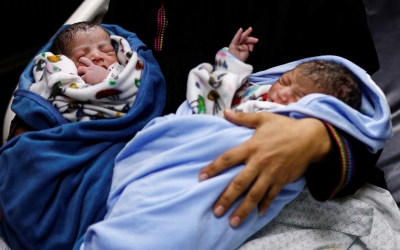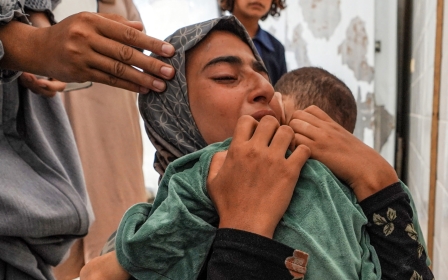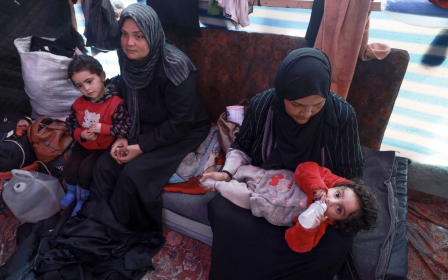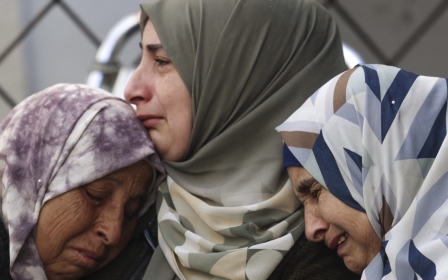War on Gaza: With no nappies, formula or food, new mothers struggle to keep their babies alive
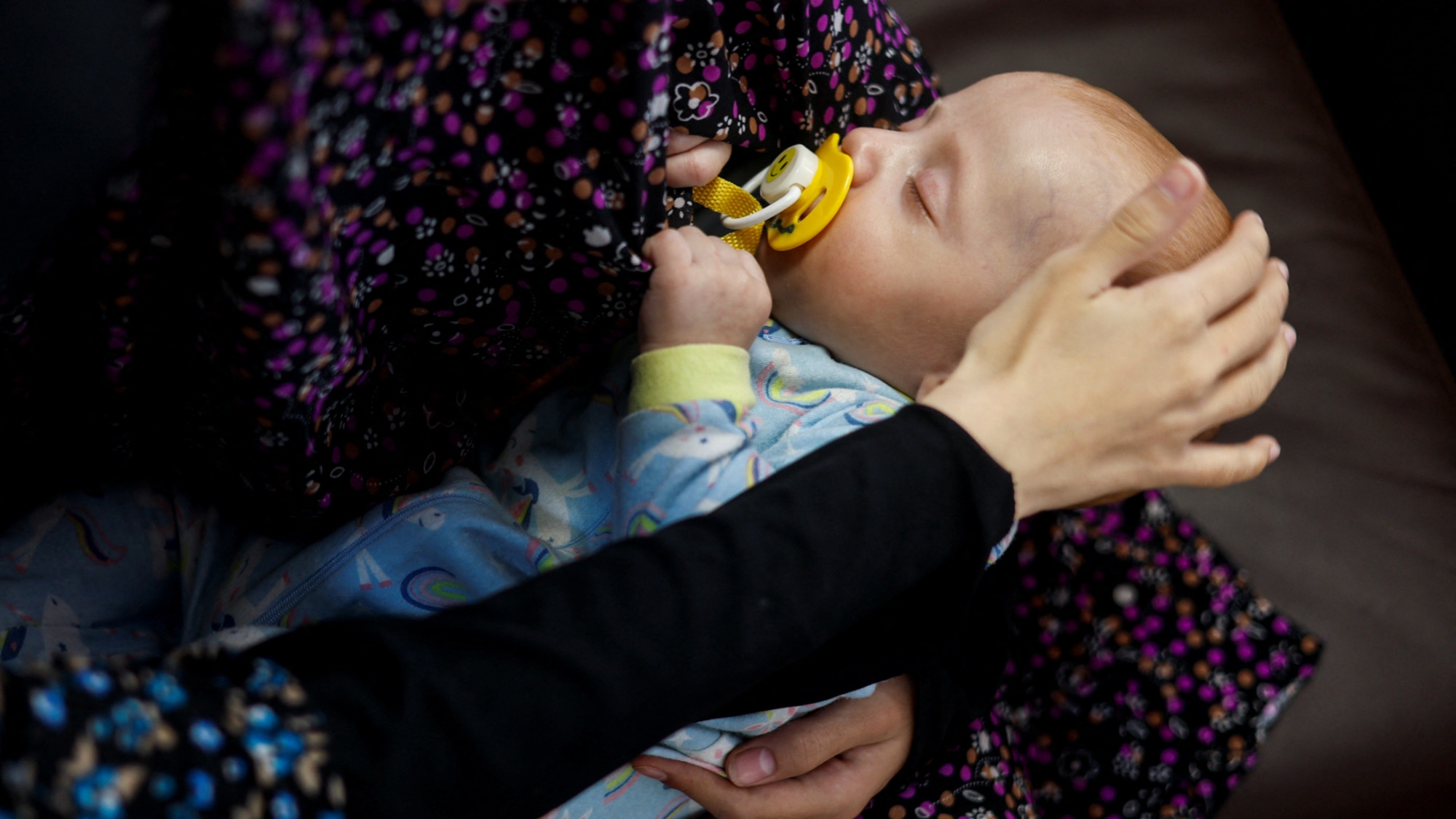
It's hardly the life Israa imagined for her baby daughter when she learned she was pregnant in late May last year.
Like most expecting mothers, she had hopes of buying soft and colourful baby blankets for her little angel Rushdi, along with other items such as socks and early-development toys.
But throughout much of her pregnancy, Israa, who gave only her first name, was instead repeatedly on the move, forced to forego baby shopping and flee on foot, precariously from one shelter to another, in an attempt to outrun Israeli air strikes and invading Israeli soldiers.
"I never imagined I would give birth to my first child away from home and surrounded by air strikes," the young mother told Middle East Eye.
In the midst of what should have been a cause for joy and celebration, Israa said she was made to think mostly about death.
New MEE newsletter: Jerusalem Dispatch
Sign up to get the latest insights and analysis on Israel-Palestine, alongside Turkey Unpacked and other MEE newsletters
The neonatal ward where she delivered in southern Gaza was filled with the cries of newborns, many of whom were severely premature, as explosions from Israeli air strikes rang out nearby, shaking the foundations of the building.
Many of the young mothers at the Emirates hospital in Rafah looked gaunt and expressionless, with fatigue, fear and trauma having long replaced the celebrations that usually accompany the birth of a child.
"Israeli air strikes hit the vicinity of the Emirates Hospital while I was inside giving birth," Israa said.
"The place where I gave birth was without any forms of sanitation and hygiene. Yet, I couldn't blame the hospital as the pressures inflicted on doctors and nurses were beyond their abilities."
Israel's war on Gaza, now in its ninth month, has rendered the enclave almost unliveable for its 2.3 million Palestinian inhabitants.
More than 37,000 people have been killed, the great majority of them women and children. Thousands more are missing or presumed to be dead under the rubble.
Displaced Palestinians are also being squeezed into ever-tighter areas of the tiny coastal enclave, prompting outbreaks of illness and disease, to which malnourished children are particularly vulnerable.
'Worst days in my whole life'
With Palestinians enduring increasingly dire conditions, the most basic of acts for new parents, such as changing a child's nappy, have become a luxury, with many mothers and carers resorting to using cloth diapers.
Now, in place of finding bottles, formula and baby food, they're instead fighting disease and a growing lack of food and water.
"I think that perhaps the first five months of my pregnancy were enough to compensate for what would come later," Israa said.
Soon after giving birth, Israa said, her family was forced to share a small room with over 17 people, which led to Israa catching the coronavirus, which was then passed on to her newborn.
"Instead of embracing my little child, I had to leave him in the incubator, looking at him far from the window for almost two weeks. Those were the worst days in my whole life."
Safe pregnancies and births have become entirely unfeasible in Gaza due to incessant Israeli bombing. In December, just three months into the conflict, the International Rescue Committee said there were at least 155,000 pregnant or breast-feeding mothers in Gaza who were at high risk of malnutrition.
Maha, another mother, told MEE: "My family would poke fun saying that each child I bore seemed to be tied to a new war."
Her first child, Kinda, was born during the 2021 Israeli war on Gaza. Around 250 Palestinians, including dozens of women and children, were killed in that conflict.
Since 7 October, Maha, who gave only her first name, has been displaced from her home in the Sheikh Radwan neighbourhood of Gaza City and forced to seek refuge with over 50 relatives in a cramped apartment bloc.
Maha said the kitchen where she stayed, with its solitary small window, became the "safest corner" in the house, a grim testament to the uncertainty of their situation.
"Nights were spent huddled on the floor, with the constant fear of air strikes dominating the scene," she said.
Threat of famine
Despite enduring endless bombings and artillery shelling, Maha faced yet another threat - famine. With flour absent from markets and fresh produce scarce, she struggled to feed herself and her yet unborn child.
"I survived on meagre rations of bread, rice and beans," Maha said. "As a result, my child was born weighing just 2.6kg."
According to the UN, a baby born weighing less than 2.5kg, regardless of gestational age, is considered as a low birth-weight baby.
Just before giving birth, Maha said she was forced to confront the urgent need for a caesarean operation due to her health situation, while also aware that Israeli tanks were just metres away from al-Sahaba hospital, the only facility equipped for childbirth in northern Gaza.
'I was uncertain whether I would die from childbirth or an Israeli missile'
- Maha, Palestinian mother
"The hospital could be surrounded at any moment," Maha said. "A single day's delay could have had dire consequences.
"I'll never forget that day. Entering the surgery room, I was uncertain whether I would die from childbirth or an Israeli missile."
Upon waking from anaesthesia, she was asked to leave the hospital as doctors feared Israeli tanks would encircle it at any moment.
Amid the fright, and with a newborn, Maha was fortunate to have access to a relative's car, unlike others who had to resort to primitive means of transportation, mainly carts dragged by animals.
But the challenges didn't end there. Just four days after giving birth, Israeli forces threatened to invade the place where Maha had sought refuge - al-Daraj neighbourhood. Now, she and her newborn, Osama, named after his uncle killed by an Israeli air strike in October 2023, faced a new wave of displacement.
"Instead of receiving medical care and follow-up for my health situation, I had to gather my belongings and carry my two children, seeking shelter elsewhere," Maha said.
"This time was even harder, as I not only endured the pains of childbirth but also displacement."
Middle East Eye delivers independent and unrivalled coverage and analysis of the Middle East, North Africa and beyond. To learn more about republishing this content and the associated fees, please fill out this form. More about MEE can be found here.


